Drug Catalog - Product Detail
DILTIAZEM HCL ER (LA) TB 300MG 90
| NDC | Mfr | Size | Str | Form |
|---|---|---|---|---|
| 68682-0707-90 | OCEANSIDE PHARMACEUTICALS | 90 | 300MG | TABLET |
PACKAGE FILES
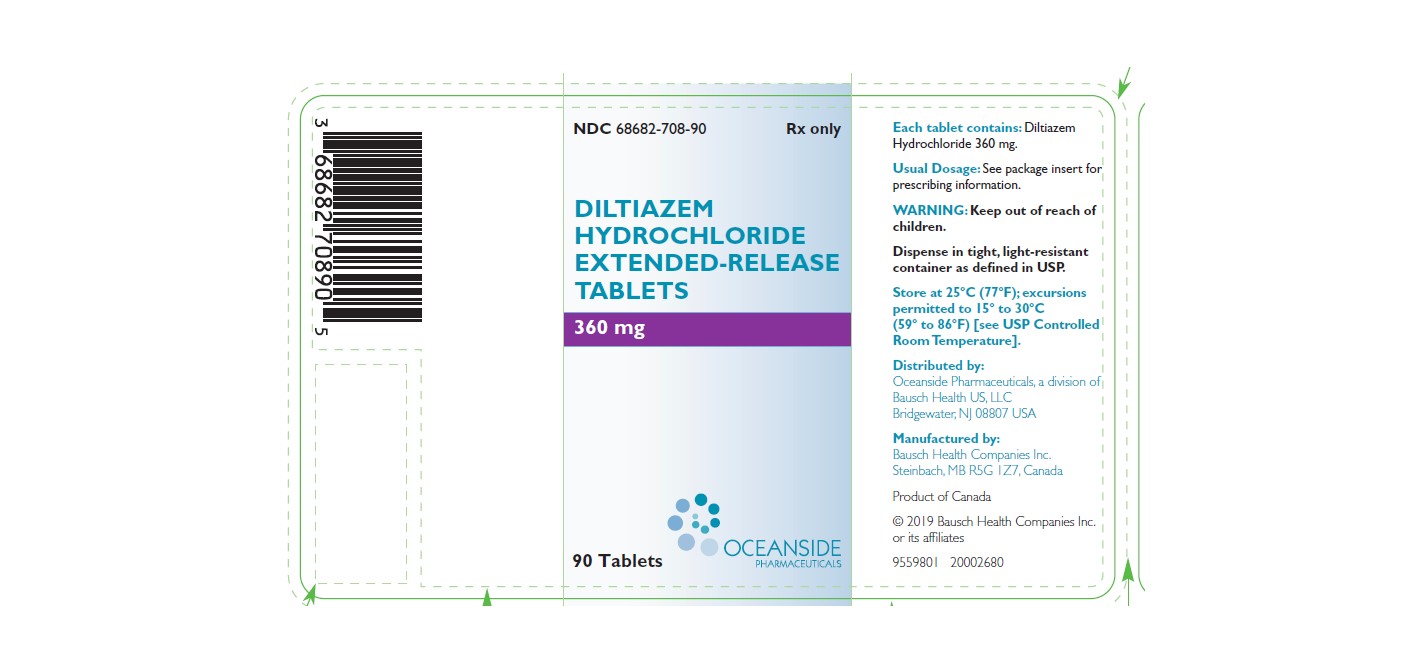
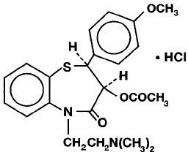
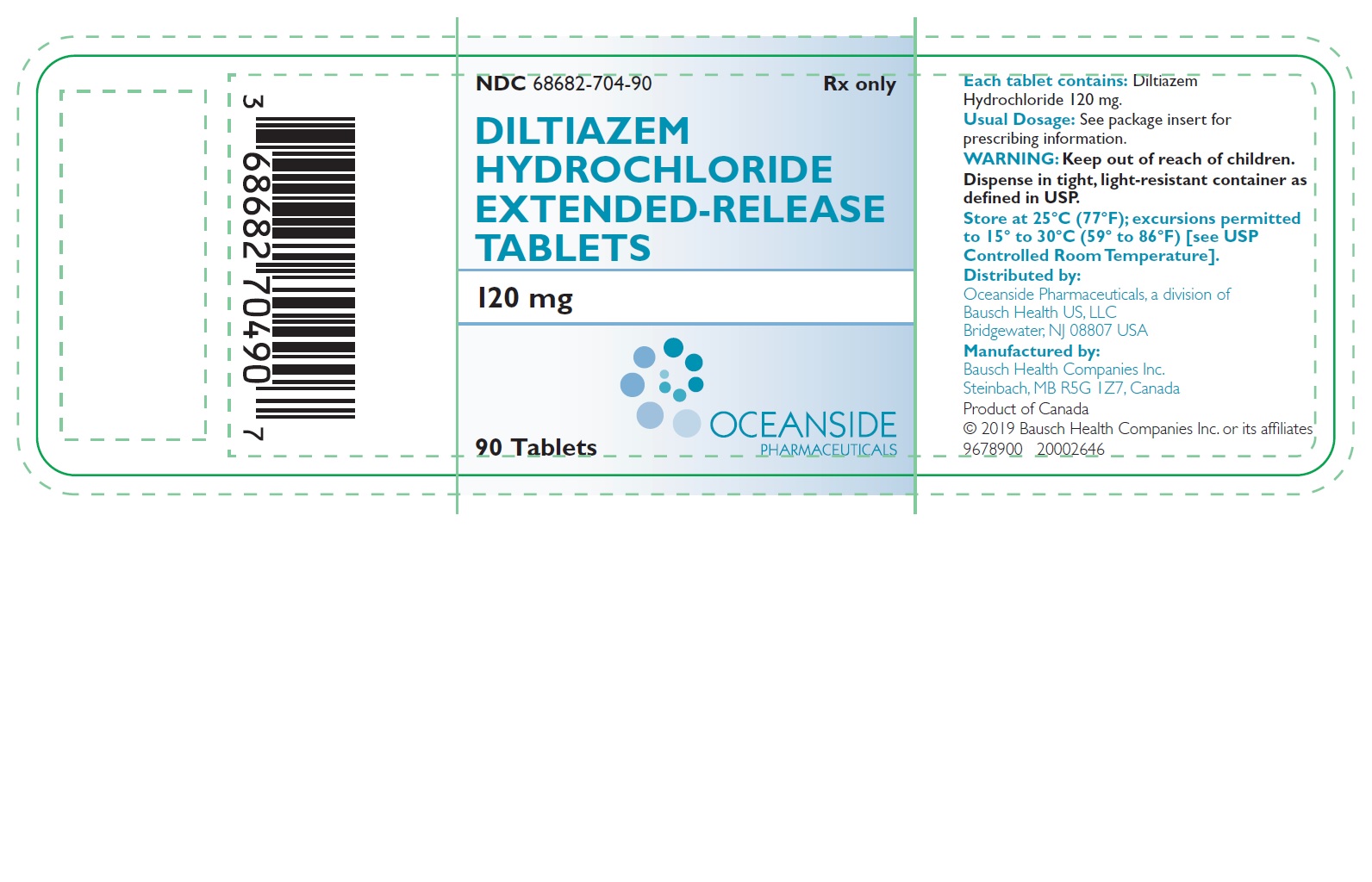
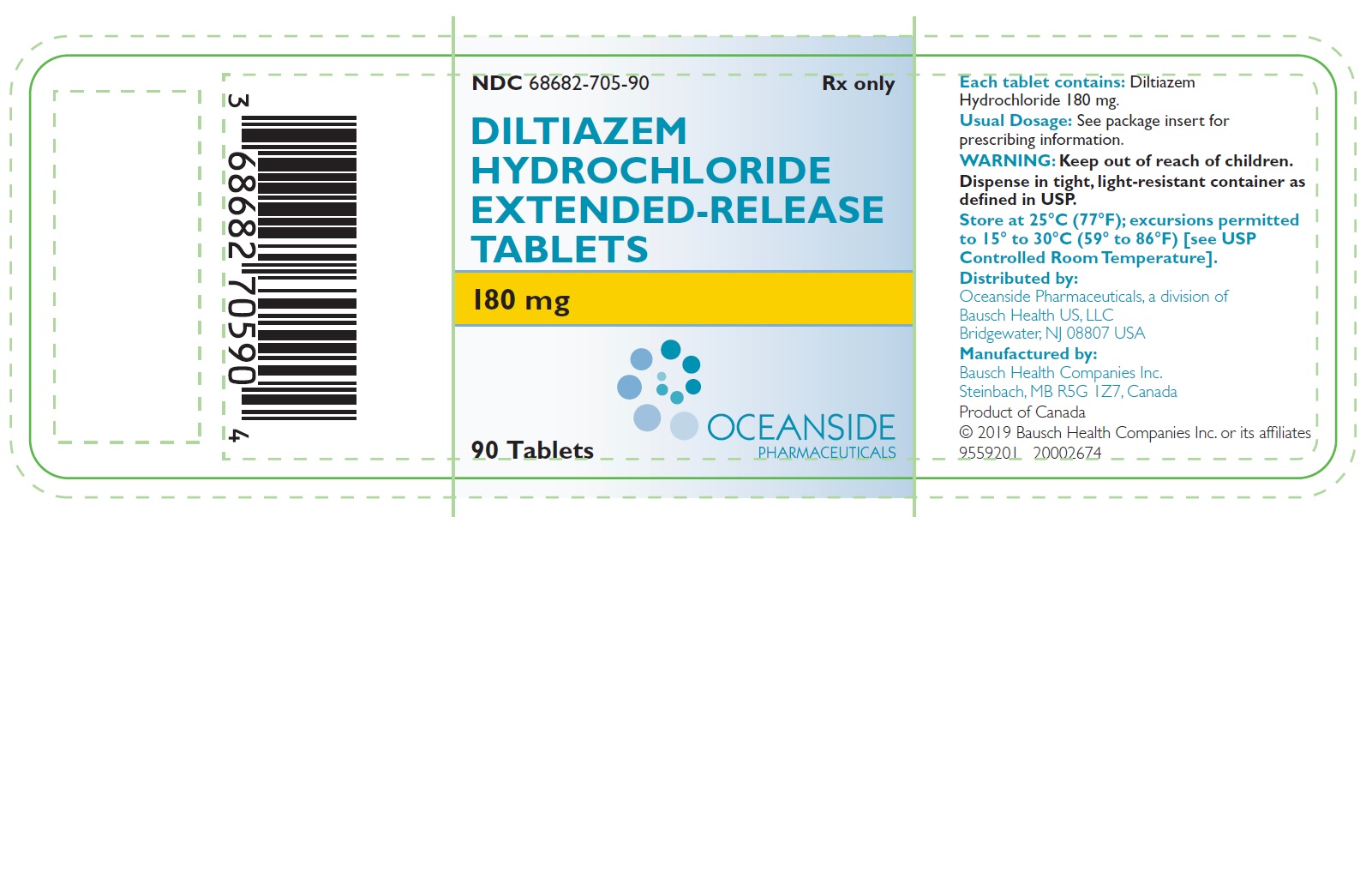
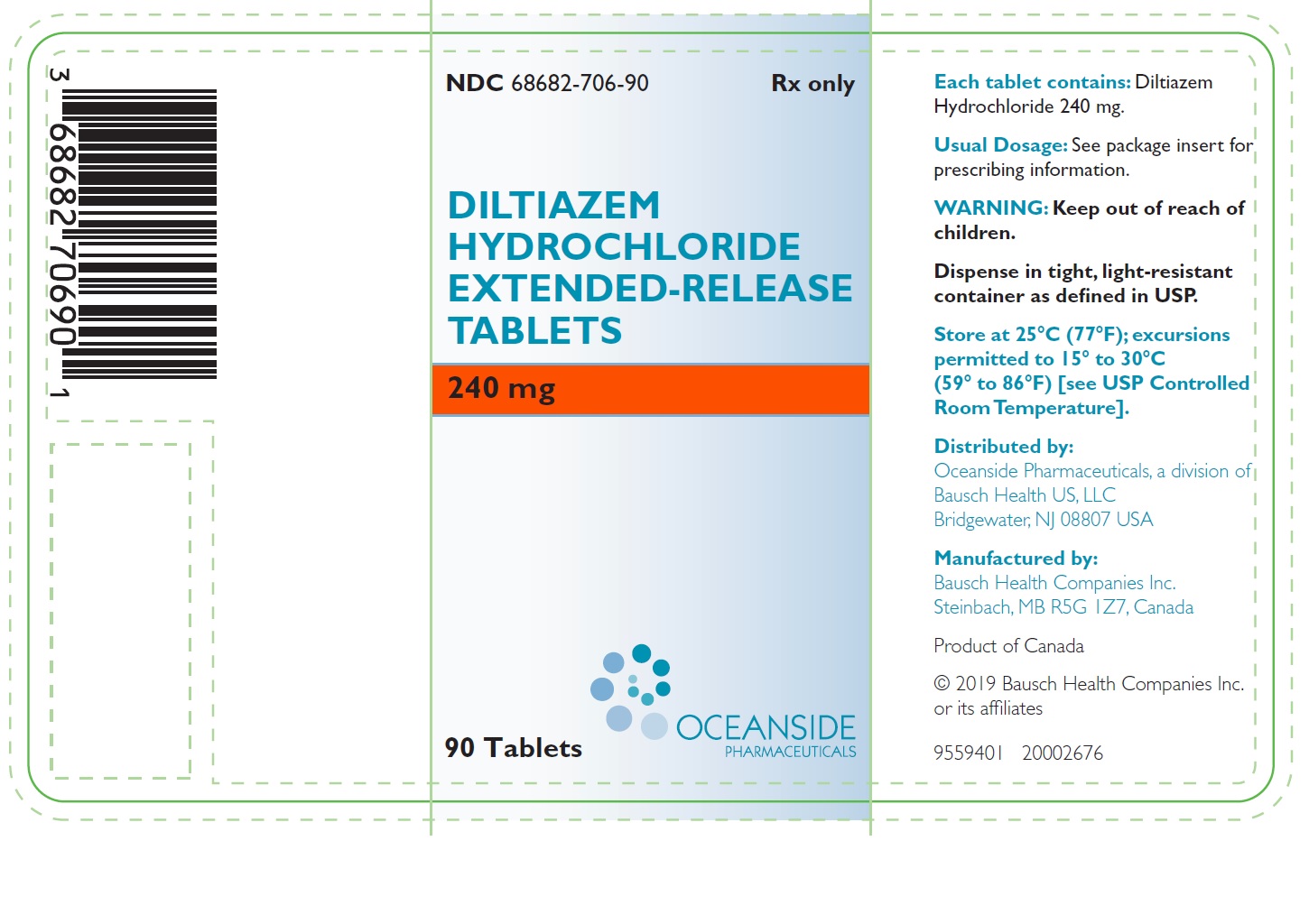
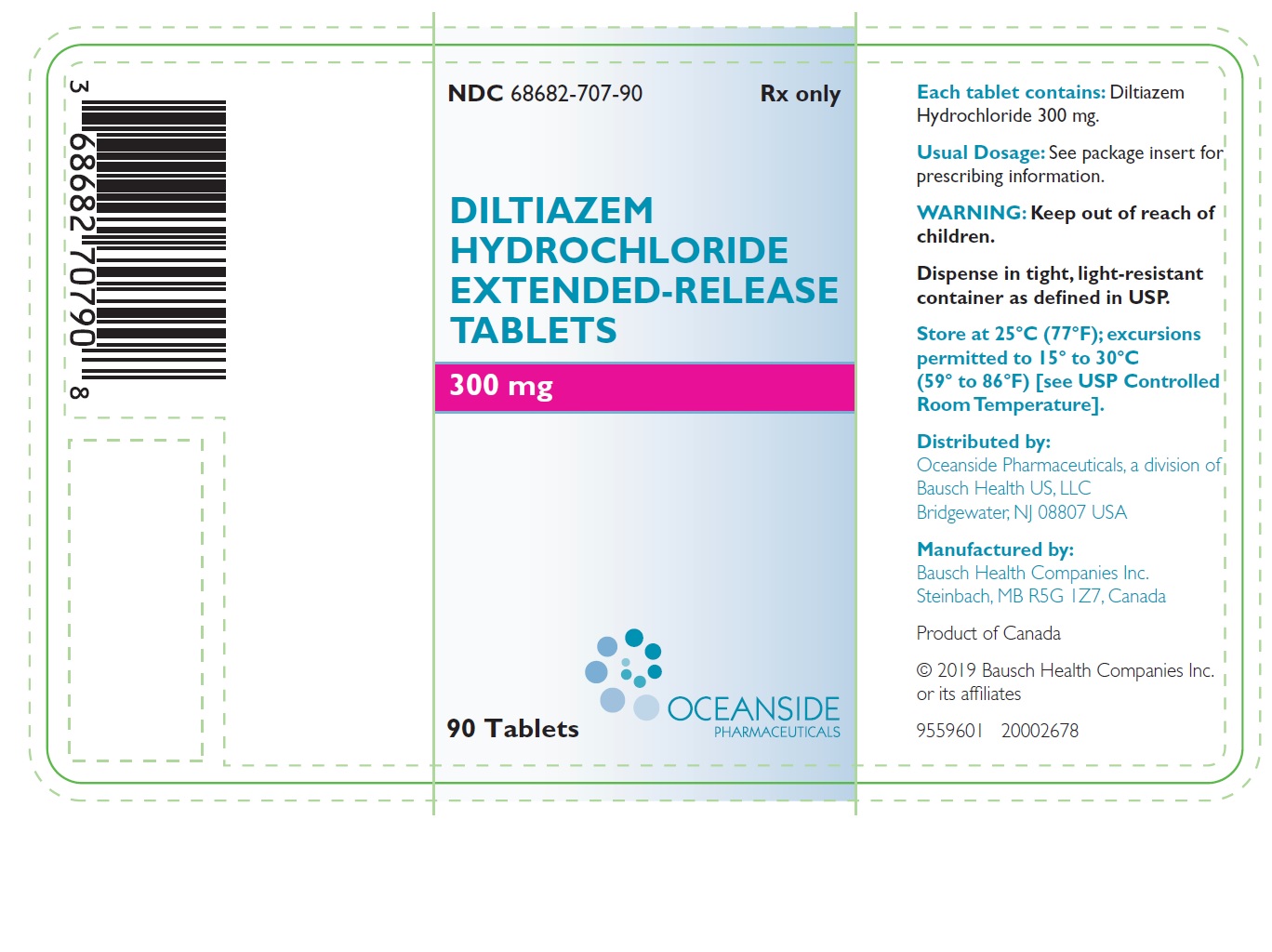
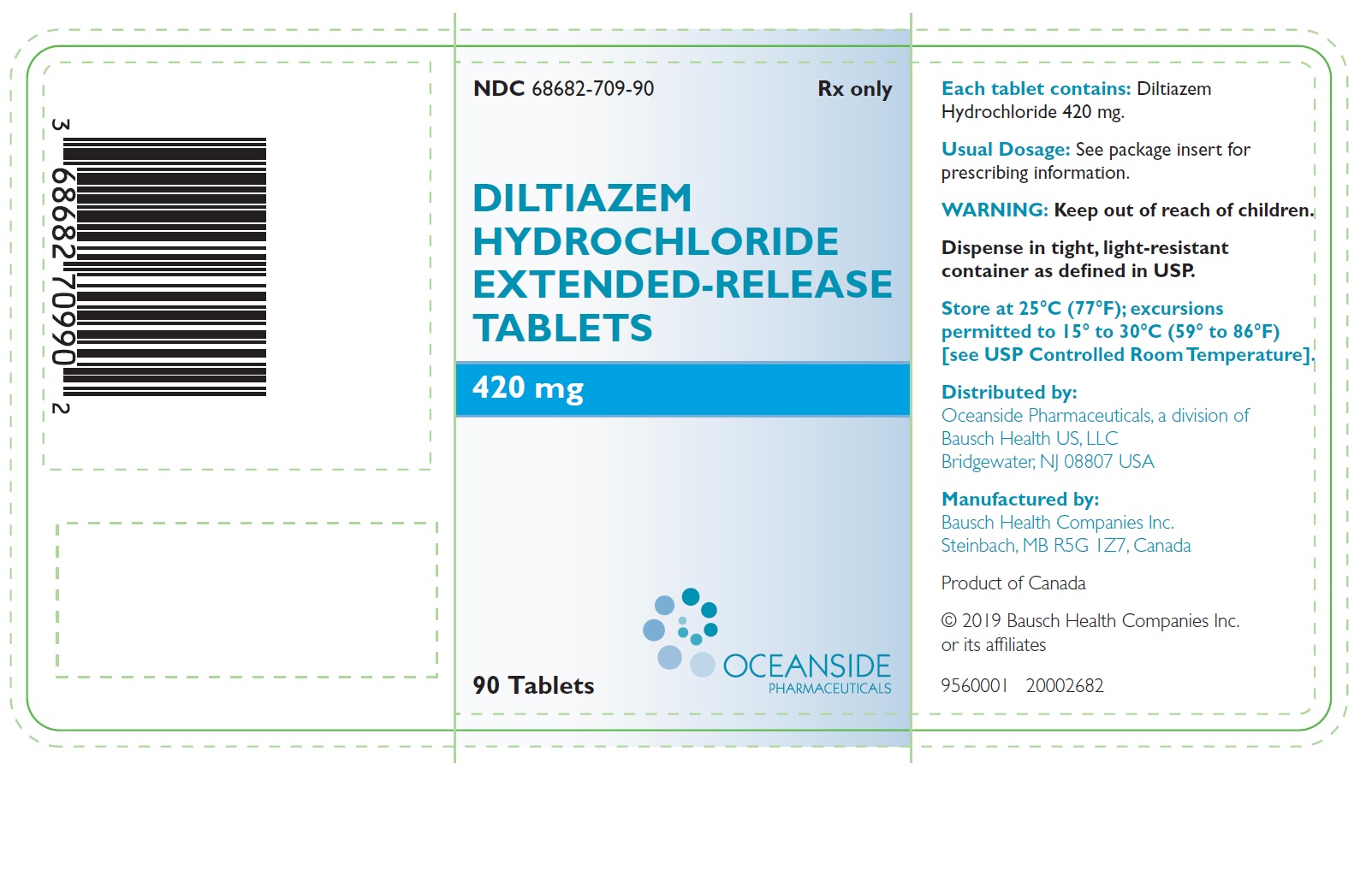
Generic Name
DILTIAZEM HYDROCHLORIDE EXTENDED-RELEASE TABLETS
Substance Name
DILTIAZEM HYDROCHLORIDE
Product Type
HUMAN PRESCRIPTION DRUG
Route
ORAL
Application Number
NDA021392
Description
11 DESCRIPTION Diltiazem hydrochloride is a nondihydropyridine calcium channel blocker (slow channel blocker or calcium antagonist). Chemically, diltiazem hydrochloride is 1,5-benzothiazepin-4(5 H )-one, 3-(acetyloxy)-5-[2-(dimethylamino)ethyl]-2, 3-dihydro-2-(4-methoxyphenyl)-, monohydrochloride, (+)- cis -. The structural formula is: Diltiazem hydrochloride is a white to off-white crystalline powder with a bitter taste. It is soluble in water, methanol and chloroform. It has a molecular weight of 450.99. Diltiazem Hydrochloride Extended-Release Tablets are formulated as a once-a-day extended-release tablet for oral administration containing 120 mg, 180 mg, 240 mg, 300 mg, 360 mg or 420 mg of diltiazem hydrochloride. Tablets also contain: carnauba wax, colloidal silicon dioxide, croscarmellose sodium, ethyl acrylate and methyl methacrylate copolymer dispersion, hydrogenated vegetable oil, hypromellose, magnesium stearate, microcrystalline cellulose, microcrystalline wax, polydextrose, polyethylene glycol, polysorbate, povidone, pregelatinized starch, simethicone, sodium starch glycolate, sucrose stearate, talc, and titanium dioxide. Chemical Structure
How Supplied
16 HOW SUPPLIED/STORAGE AND HANDLING Diltiazem Hydrochloride Extended-Release Tablets are supplied as capsule shaped, white, film-coated tablets, debossed with “B” on one side and the diltiazem content (mg) on the other. Strength NDC # Bottles of 30 NDC # Bottles of 90 120 mg NDC 68682-704-30 NDC 68682-704-90 180 mg NDC 68682-705-30 NDC 68682-705-90 240 mg NDC 68682-706-30 NDC 68682-706-90 300 mg NDC 68682-707-30 NDC 68682-707-90 360 mg NDC 68682-708-30 NDC 68682-708-90 420 mg NDC 68682-709-30 NDC 68682-709-90 Storage conditions: Store at 25°C (77°F); excursions permitted to 15° to 30°C (59° to 86°F) [see USP Controlled Room Temperature]. Avoid excessive humidity and temperatures above 30°C (86°F). Dispense in tight, light resistant container as defined in USP.
Indications & Usage
1 INDICATIONS AND USAGE Diltiazem Hydrochloride Extended-Release Tablets is a nondihydropyridine calcium channel blocker indicated for: • treatment of hypertension, to lower blood pressure. Lowering blood pressure reduces the risk of fatal and nonfatal cardiovascular events, primarily strokes and myocardial infarctions. It can be used alone or in combination with other antihypertensives. ( 1.1 ) • improving exercise tolerance in patients with chronic stable angina. ( 1.2 ) 1.1 Hypertension Diltiazem Hydrochloride Extended-Release Tablets are indicated for the treatment of hypertension, to lower blood pressure. Lowering blood pressure reduces the risk of fatal and nonfatal cardiovascular events, primarily strokes and myocardial infarctions. These benefits have been seen in controlled trials of antihypertensive drugs from a wide variety of pharmacologic classes including this drug. Control of high blood pressure should be part of comprehensive cardiovascular risk management, including, as appropriate, lipid control, diabetes management, antithrombotic therapy, smoking cessation, exercise, and limited sodium intake. Many patients will require more than one drug to achieve blood pressure goals. For specific advice on goals and management, see published guidelines, such as those of the National High Blood Pressure Education Program’s Joint National Committee on Prevention, Detection, Evaluation, and Treatment of High Blood Pressure (JNC). Numerous antihypertensive drugs, from a variety of pharmacologic classes and with different mechanisms of action, have been shown in randomized controlled trials to reduce cardiovascular morbidity and mortality, and it can be concluded that it is blood pressure reduction, and not some other pharmacologic property of the drugs, that is largely responsible for those benefits. The largest and most consistent cardiovascular outcome benefit has been a reduction in the risk of stroke, but reductions in myocardial infarction and cardiovascular mortality also have been seen regularly. Elevated systolic or diastolic pressure causes increased cardiovascular risk, and the absolute risk increase per mm Hg is greater at higher blood pressures, so that even modest reductions of severe hypertension can provide substantial benefit. Relative risk reduction from blood pressure reduction is similar across populations with varying absolute risk, so the absolute benefit is greater in patients who are at higher risk independent of their hypertension (for example, patients with diabetes or hyperlipidemia), and such patients would be expected to benefit from more aggressive treatment to a lower blood pressure goal. Some antihypertensive drugs have smaller blood pressure effects (as monotherapy) in black patients, and many antihypertensive drugs have additional approved indications and effects (e.g., on angina, heart failure, or diabetic kidney disease). These considerations may guide selection of therapy. Diltiazem Hydrochloride Extended-Release Tablets may be used alone or in combination with other antihypertensive medications. 1.2 Angina Diltiazem Hydrochloride Extended-Release Tablets are indicated to improve exercise tolerance in patients with chronic stable angina.
Dosage and Administration
2 DOSAGE AND ADMINISTRATION Take Diltiazem Hydrochloride Extended-Release Tablets once a day at approximately the same time. Do not chew or crush the tablet. • Tablet should be swallowed whole and not chewed or crushed. ( 2 ) • Hypertension: Initial adult dose is 180 to 240 mg once daily. Adjust dose according to blood pressure response to a maximum of 540 mg daily. ( 2.1 ) • Angina: Initial adult dose is 180 mg once daily. Adjust dose according to response to a maximum of 360 mg. ( 2.2 ) • Switching to Diltiazem Hydrochloride Extended-Release Tablets: Patients may be switched to the nearest equivalent total daily diltiazem dose. ( 2.3 ) 2.1 Hypertension Initiate dosing at 180 to 240 mg once daily, although some patients may respond to lower doses. Titrate according to blood pressure to a maximum of 540 mg daily. Maximum antihypertensive effect is usually observed by 14 days of chronic therapy. 2.2 Angina Initiate dosing at 180 mg once daily and increase dose at intervals of 7 to 14 days if adequate response is not obtained, to a maximum of 360 mg. 2.3 Switching to Diltiazem Hydrochloride Extended-Release Tablets Patients controlled on diltiazem alone or in combination with other medications may be switched to Diltiazem Hydrochloride Extended-Release Tablets once a day at the nearest equivalent total daily dose. Higher doses of Diltiazem Hydrochloride Extended-Release Tablets may be needed in some patients based on clinical response.
